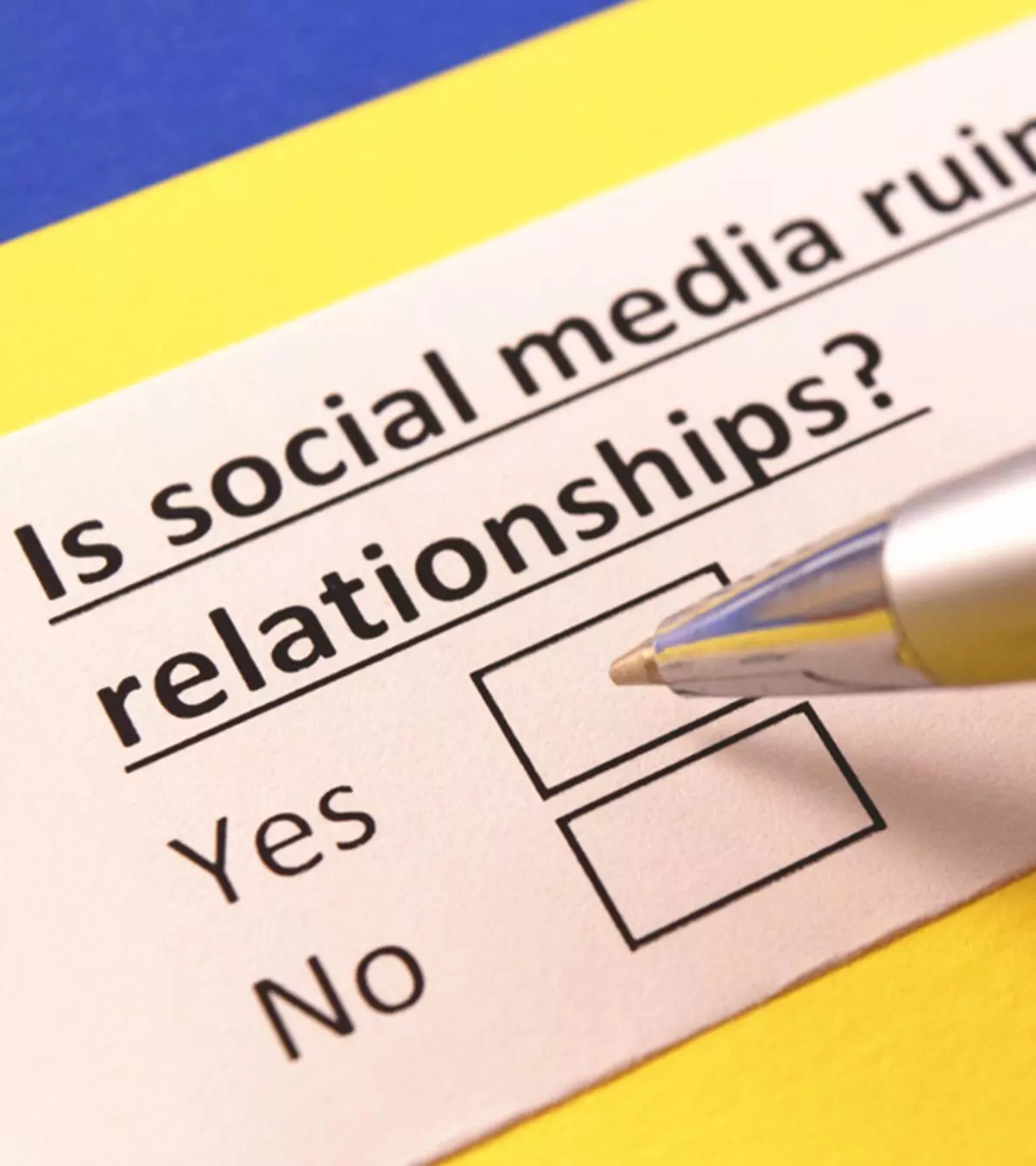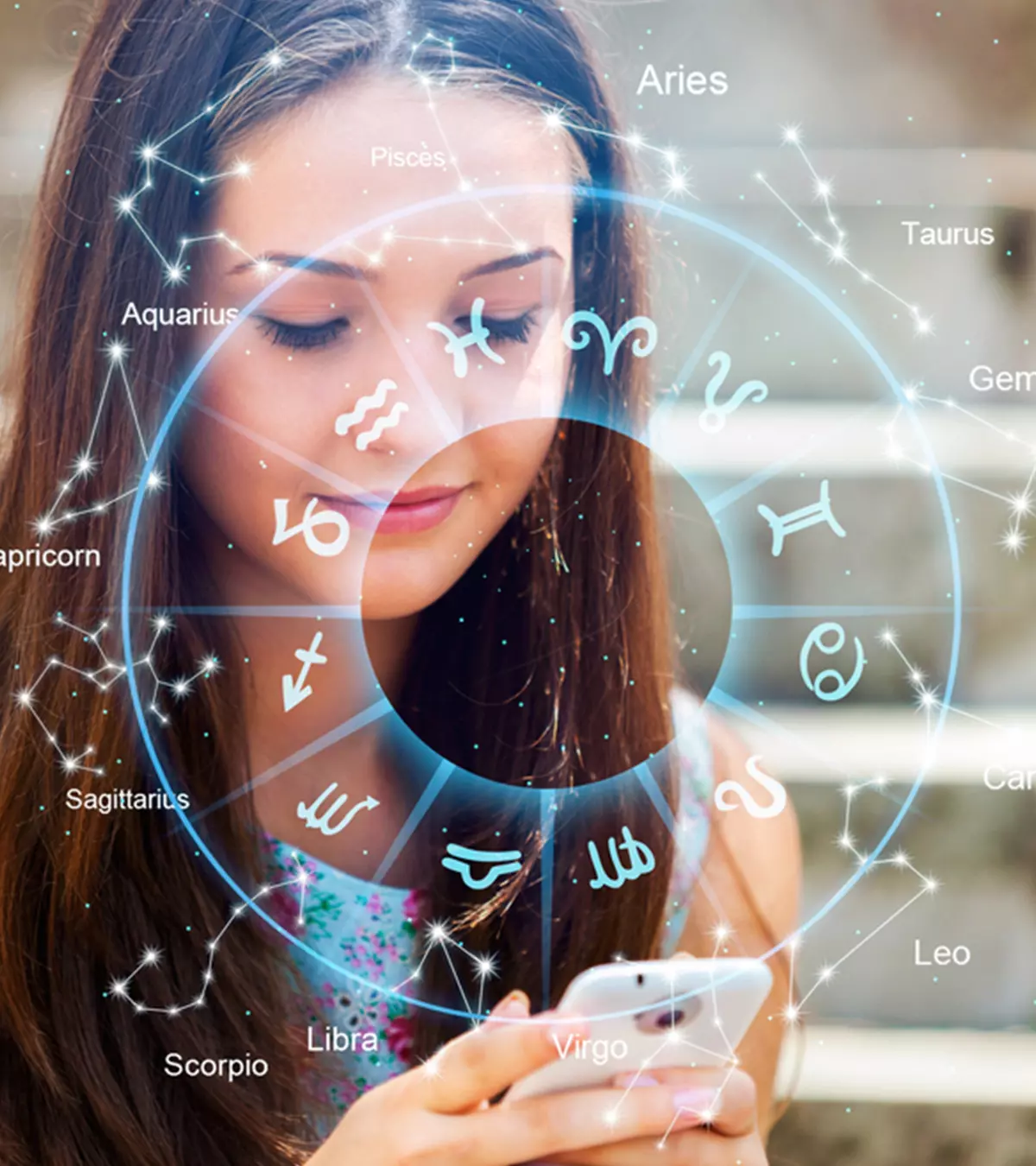
Image: Shutterstock
In today’s digital era, you may have heard or seen statements about the detrimental impact of an online presence or how social media ruins relationships. There’s no doubt that social media has become embedded in our daily lives. Although it helps us communicate better with others and build connections, we must also recognize its potential to harm personal relationships. Besides affecting your relationships with friends and family, social media can also cause conflicts in marriage and love life. Of course, it’s natural to dispute or bicker with your partner, but you could encounter people nowadays who argue with their partner simply because they like someone’s Facebook profile photo, taking it as their liking for that person. In this post, we discuss some ways in which social media harms relationships.

Key Pointers
- Though social media has the power to influence people optimistically, certain negative effects might cause problems in your love or married life.
- From insecurities, intruding on your privacy, to consuming your precious time into stalking and addiction, social media could cause tiffs between partners.
- Try to understand the more harm it does and limit your time on social media.
Can Social Media Really Destroy A Relationship?
Social networking sites or social media platforms help you in influencing and connecting with people and exhibit your achievements, talents, and personal life. And through these sites, you start living an online life where you can be anything you want. This online life shows people only what you want them to see and portrays a fancy picture of you. When your online life overshadows your real life, it is bound to impact your personal relationships. You start to spend more time online than having interaction with your family and friends.
Like most other addictions, fixation with social media is not healthy and can affect personal relationships. Below are some reasons that explain the bad effects of social media addiction.
16 Ways How Social Media Destroys Relationships
Although social media is supposed to be a useful communication tool, overusing it can affect personal relationships in the following ways.
1. Your past may interfere with your present

You may be happy with your current partner. But when an ex messages you on your messenger, it can refresh memories and tempt you to get back with them. You may not have any wrong intentions, but the fact that you are in touch with someone you once shared a close relationship with might make your partner feel insecure and even cause friction between you two. It is best to keep your past from interfering with your present.
2. Phubbing can be humiliating
Phubbing is a term used to explain the habit of ignoring or snubbing someone present right in front of you by your engagement in your phone (1).
Although the term “phubbing” is not well-known, 51 % of Americans in romantic relationships report that their partner is often or sometimes distracted by their phone during conversations, with 40% admitting to being bothered by the time their partner spends on their mobile.

Americans\' views on their partner\'s phone distractions in a relationship
Source: Dating and Relationships in the Digital Age; Pew Research CentreImagine how awful it must feel when you tell your partner how someone was mean to you at work, and they suddenly guffaw because they saw a funny meme on Facebook. Such behavior is sure to hurt anyone emotionally.
3. Your virtual life can take over your personal life

Your partner plans a romantic date night for you, and as soon as you reach the restaurant, you first check your Facebook update. Then, you click a lovely couple photo as soon as you get to the table and upload it as your WhatsApp status. When your food arrives, you cannot have it immediately because you are busy trying to get the perfect shot for your Instagram. And then you spend the rest of the evening checking the likes and comments on your pictures. This unending obsession with social media might frustrate your partner as you two hardly get to speak to each other the entire evening. The need to have a cool virtual life can damage your personal life.
4. You may find it difficult to avoid temptations
Social media has made everyone “approachable.” People who we would not approach in real life become easy to talk to online. This ease in communication makes you want to explore your options in terms of dating and romance. This could lead you to cheat on your partner because it is easy to flirt from behind the safety of a phone or a computer screen.
5. You may become less interested in each other
Previously, couples would enjoy cuddling on the bed or sofa, but nowadays, couples reach straight for their cell phones instead of talking to or holding each other. Even before getting intimate, couples are often on their phone instead of indulging in some fun foreplay. Over time, this could lead to dissatisfaction in bed and a total lack of interest in physical intimacy thereby, leading to isolation or alienation.
6. Your expectations from your partner may change
When we see our friends put up lovey-dovey couple photos online, we too wish to do the same. This can lead to conflicts, especially when your partner is not able to meet your expectations. By posting romantic images and status online, we manage to paint a rosy picture, but in real life, we lose chances to strengthen a love relationship. This public display of affection instead of a personal conversation can have a negative impact on couples.
 Did you know?
Did you know?7. It may intrude on your privacy

Some people are obsessed with generating online buzz that they upload pictures of even their most intimate moments. When you do it just to prove that you have a great relationship, it does nothing but steal your precious private moments of happiness and leaves you with a desperate need for validation.
8. Unwanted attention can spoil the mood
You are on vacation with your partner on an exotic island. You post a picture on the beach and are glued to your phone to check the likes you get. Someone posts a nasty comment that spoils your mood and ruins your vacation with your better half. People’s opinion matters, but you should not seek it for every event in your life. Let some special moments be exclusive for only you and your partner.
9. It can make you insecure
It is not uncommon for spouses to check the reactions to their partner’s status and pictures online. You want to know who is commenting on your partner’s posts and what your partner is replying to them. And if you spot their former love interest or someone they once liked comment on their post, the insecure part of you might just get into an argument with your partner over it.
 Research finds
Research finds10. It can dwindle intimate personal conversations

When you started dating your partner, you must have spent hours chatting with them online. Back then, your heart would ache from wanting to meet them personally. Now that you are right next to them, all you do is flick through one social media to another on your phone. Addiction to social media can eat into your personal time and cause a disconnection from the intimate conversations with your partner.
11. It could lead to unhealthy comparisons
You may have a happy and content family life, but the moment you see your friend partying at an expensive club with their partner, you will feel unhappy about not being able to do the same. You may feel that your friend is happy with her spouse while you are living a boring, average life. This comparison may lead to discontentment in life and cause strains in a relationship.
12. It can deprive you of attention in real life
Your partner may put up a mandatory “Happy Birthday” post for you online, expressing how much they love you. But if they do not even offer a warm kiss on your birthday in real life, what is the point of it? Partners feel that posting a public love declaration is now enough to keep your partner happy. This thought is wrong, and the lack of personal attention in real life can take a toll on your relationship.
13. Posting every emotion online can cause unwanted fights
Imagine your spouse returning home angry because their colleague asked them about your fight that morning. How did they know? They read your cryptic post about marriage being difficult and your spouse being uncaring of your feelings. Online posts often display what you may be feeling in real life. This habit of yours can annoy your partner and cause unwanted fights.
14. Stalking can become addictive
Your spouse may have revealed about their past relationships or romantic conquests to you. You may act unaffected on the outside, but the moment you are alone, you might check out their “ex’s” online activities. You might start feeling jealous and may obsessively stalk them to know more about them and check if they are in touch with your partner. This obsessive behavior is toxic for your relationship.
15. You may need to live up to people’s expectations constantly

The need to maintain a happening social life may make you want to live according to it. You may want the latest gadgets or luxury products to be able to show off online, and you may start visiting restaurants and other places not because you are interested but because of all the hype around it online. Your need to update your social media can affect not just your bank balance, but also your relationship with your partner, who might disapprove of this behavior.
16. You can get digitally manipulated
You see a couple wearing branded outfits, traveling in an expensive car, touring the most expensive places, and having a happy life. Their inspirational captions might make you believe they are living a dream life. However, what you see on social media may not always show the real picture. People only show the good part of their life on social media and keep their struggles hidden. However, you may compare your relationship to theirs and feel disappointed. You may feel your partner is inadequate, and you are missing out on something. These unrealistic expectations may cause trouble in your relationship.
Frequently Asked Questions
1. Should I check my partner’s social media?
The answer is no. Respect your partner’s privacy. If you have the urge to check what your partner is doing on their phone, there is no trust in your relationship. Checking your partner’s phone without their consent can violate their privacy.
2. How do I stop social media from complicating my relationship?
Set common rules such as not using social media during dinner and bedtime, and ensure to obey these rules. Make sure to spend quality time with your partner every day and catch up on each other’s life. Establishing these kinds of relationship goals will help strengthen your bond and keep your connection strong. Keep your relationship your top priority, and say no to the temptation of posting in real time.
3. How can I reduce the amount of arguments I have with my partner due to social media?
Have open and honest communication with your partner regarding your concerns about social media. Express your concerns openly and establish clear boundaries around social media usage to protect your relationship. Take regular breaks from social media and dedicate quality time to activities that strengthen your connection and intimacy. If you and your partner have conflicting views on social media use, compromise and find a mutually agreeable middle ground.
4. Can social media be beneficial for relationships?
Yes, social media can strengthen relationships by helping partners stay connected and share special moments. It allows you to celebrate milestones and communicate in real time with your partner despite the distance.
You must have heard about the positive impacts of social media. But once it becomes an obsession, saying that social media can be misleading and ruin relationships is not wrong. In a quest to keep up with the standards of your online friends, you may lose connection with your real partner. For example, you may be busy counting the likes on your beach holiday pictures rather than enjoying the sunset with your beloved. Unhealthy comparisons, spamming, and impractical aspirations to show off on social media can prevent you from leading a fulfilling life. Make sure to limit your time on social media to pay more attention to relationships that need to be nurtured in real life.
Infographic: Tips For Using Social Media Mindfully
Social media may help build a relationship or shatter it irrevocably, depending on how it is used. Thus, individuals need to realize the importance of mindful social media use. Mindful social media use lets an individual enjoy social media while averting its adverse effects on one’s relationship. In this infographic, we have listed effective tips on how an individual can use social media responsibly and prevent its negative impact on a relationship.
Some thing wrong with infographic shortcode. please verify shortcode syntax
Illustration: Ways Social Media Is Ruining Relationships

Image: Stable Diffusion/MomJunction Design Team
Social media only highlights the good and happy side of life, but what about the challenging and difficult part? Learn how it has been affecting relationships and how to use it responsibly.
References
1. Social Media Use and Its Impact on Relationships and Emotions; Brigham Young University BYU ScholarsArchive
2. Alana Cole et al., (2018); Social Media and Couples: What Are the Important Factors for Understanding Relationship Satisfaction?; Cyberpsychology, Behavior, and Social Networking.
3. Lucas Silva Lopes et al., (2025); Problematic Social Media Use and Its Relationship with Depression or Anxiety: A Systematic Review; Cyberpsychology, Behavior, and Social Networking.
Community Experiences
Join the conversation and become a part of our nurturing community! Share your stories, experiences, and insights to connect with fellow parents.
Read full bio of Shreshtha Dhar
Read full bio of Ratika Pai
Read full bio of Akshay Nair
Read full bio of Benidamika J Latam

















